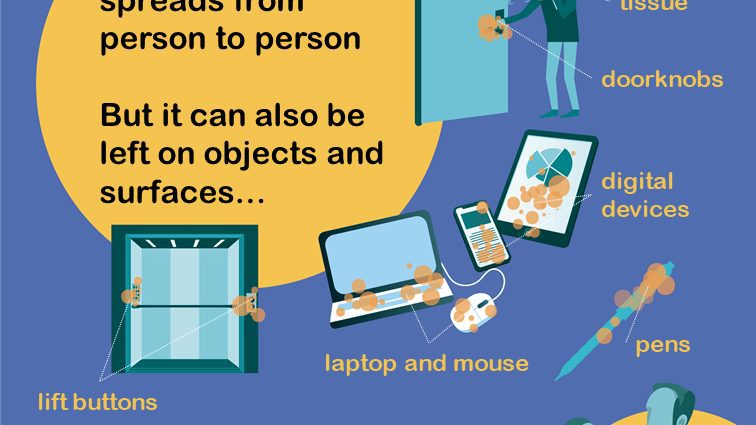Mukati

Le coronavirus has claimed millions of lives around the world, resulting in thousands of deaths. To this day, it continues to have a strong presence in Europe. It is spread from an infected person to a healthy person, by direct contact or via contaminated surfaces. It could be Covid-19 can also infect people through other means, such as through the air. Can you be contaminated with Covid-19 through the air?
Chikwata chePasportSanté chiri kushanda kuti chikupe ruzivo rwakavimbika uye rwechinyakare pane iyo coronavirus. Kuti uwane zvimwe, tsvaga:
|
The spread of Covid-19
Straight imported from China, the new coronavirus is of animal origin. It has been transmitted to humans. Iyo Covid-19 is extremely contagious and can be deadly. It is quite mysterious and teams of scientists are working tirelessly to provide more information and evidence to fight this virus. Through studies and research, some points are highlighted. New coronavirus can be transmitted by soiled materials and objects, used in everyday life. Concretely, contaminated people expel fine droplets by sneezing or coughing. These postilions arrive on surfaces and contaminate them. The problem is that the coronavirus can survive on these different materials.
An American study carried out research on the lifespan of Covid-19 on the different materials. In this way, touching a surface without first disinfecting it can be a vector of Covid-19 chirwere. Indeed, the virus could live there for several hours up to a few days, and therefore remains a source of infection:
- copper (jewelry, kitchen utensils, staples, etc.): up to 4 hours
- cardboard (parcels, food packaging, etc.): up to 24 hours
- stainless steel (cutlery, door handles, elevator buttons, etc.): up to 48 hours
- plastic (food packaging, car interiors, etc.): up to 72 hours
The lifespan of Covid-19 on surfaces may vary depending on temperature and humidity. Even if the doctors themselves do not know exactly how long the virus lives on the materials, it is nevertheless necessary to remain vigilant, without falling into the obsession. Contamination via infected surfaces remains very minimal.
Hygiene measures to be observed
It is essential, to limit the spread of the coronavirus, to respect the elementary rules of hygiene:
- wash your hands regularly, especially when returning from shopping
- frequently clean potentially soiled objects (door handles, keys, toilet flushes, etc.)
- respect social distancing measures (stand at least one meter away from another person)
- cough and sneeze into his elbow
- wear a mask so weary of the Covid-19
- ventilate your home for at least 15 minutes a day
- shandisa matishu anoraswa
- take a shower on your way home if there has been contact with other people, such as health workers.
Covid-19: can we be contaminated by the air?
In this same American study, scientific researchers developed experiments. They reproduced the ejection of fine droplets containing particles of Covid-19 in the air, using an aerosol spray. The aim was to reproduce postilions from an infected person to the new coronavirus when she talks, coughs or sneezes. The droplets landed on the surfaces, but also remained in the air. The researchers took samples 3 hours later. They analyzed samples: particles of Covid-19 were suspended in the air. Be careful, however, because these were found only in tiny quantities, while at the base, the sample was loaded. On the other hand, according to a Chinese study, people would have been contaminated via the ventilation system of a restaurant. There would therefore be a very low risk contamination of the coronavirus through the air that one breathes.
How to limit the transmission of Covid-19?
To limit the rate ofinfection Covid-19, we must respect the barrier measures taken by the government. These tips to reduce the transmission of the coronavirus from health authorities. Thus, the chain of propagation will be broken and the number of people infected with this new coronavirus will be down. The French government works in close collaboration with doctors, infectious diseases specialists and other health professionals. If everyone adopts the right behavior and only goes out when needed, it will save many lives.
In addition, wearing a mask is made compulsory in places closed since July 20. This is how you have to go out, masked, to shop, go to the bank or go to the cinema. From September 1, the mask must be worn by company employees, when social distancing is not possible. In middle and high schools, teachers and students are required to wear their masks. In France, the mask is imposed from the age of 11, unlike Italy, a country bruised by the coronavirus, who is from 6 years old. In the streets, certain districts or public gardens, the mask also becomes compulsory, by prefectural or municipal decisions. In Paris, Lyon, Marseille, Rouen, Bordeaux as well as in thousands of other cities, wearing a mask is mandatory to fight against the epidemic linked to the coronavirus. Failure to comply with this measure may result in a fine of up to € 135.










